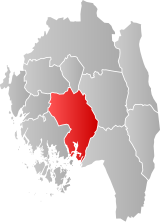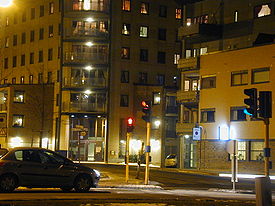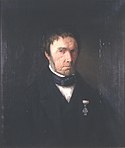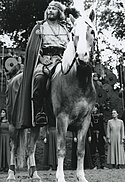Sarpsborg
Sarpsborg Municipality Sarpsborg kommune | |
|---|---|
 Parts of Sarpsborg | |
 Østfold within Norway | |
 Sarpsborg within Østfold | |
| Coordinates: 59°17′09″N 11°06′43″E / 59.28583°N 11.11194°E | |
| Country | Norway |
| County | Østfold |
| Administrative centre | Sarpsborg |
| Government | |
| • Mayor (2023) | Magnus Arnesen (H) |
| Area | |
• Total | 406 km2 (157 sq mi) |
| • Land | 370 km2 (140 sq mi) |
| • Rank | #238 in Norway |
| Population (31 December 2022) | |
• Total | 59,038 |
| • Rank | #13 in Norway |
| • Density | 134/km2 (350/sq mi) |
| • Change (10 years) | |
| Demonym | Sarping[1] |
| Official language | |
| • Norwegian form | Bokmål |
| Time zone | UTC+01:00 (CET) |
| • Summer (DST) | UTC+02:00 (CEST) |
| ISO 3166 code | NO-3105[3] |
| Website | Official website |
Sarpsborg (pronounced [ˈsɑ̀ʂbɔr] or [ˈsɑ̀rpsbɔrɡ]), historically Borg, is a city and municipality in Østfold county, Norway. The administrative centre of the municipality is the city of Sarpsborg.
Sarpsborg is part of the fifth largest urban area in Norway when paired with neighbouring Fredrikstad. As of 1 January 2018, according to Statistics Norway these two municipalities have a total population of 136,127 with 55,840 in Sarpsborg and 81,278 in Fredrikstad.[4]
Statistics for 2021, say that the city has a population where 19% of the children belong to families that have "low-income in the long-term"; that is the highest level for a city (in Norway); the national level is 11.3%.[5]
General information
Name
In Norse times the city was just called Borg (from borg which means "castle"). The background for this was the fortification built by Olav Haraldsson (see History section). Later the genitive case of the name of the waterfall Sarpr (Sarp Falls) was added, it's unclear how Sarpsborg received this part of its name, two interpretations are the most prevalent. The first coming from the Icelandic word Sarpr which means birdcage in English. The other interpretation is that Sarpr means "the one who swallows", probably referring to the local waterfall.[6]
In Norse times Østfold county was called Borgarsýsla which means "the county (sýsla) of Borg" and the law district of southeast Norway was called Borgarþing meaning "the thing/court of Borg".
The old name has been revived in the diocese of Borg (1968) and Borgarting Court of Appeal (1995).
Coat of arms
The coat-of-arms is from modern times and was granted on 13 November 1991. It is based on a coat of arms dating from 1556 and shows a bear above a castle. The bear was introduced as early as some time in the 13th century, by the earl of Sarpsborg (Comes de Saresburgh), Alv Erlingsson. He used the bear to symbolise his strength.[citation needed] The castle symbolises the fortress (borg) that gave the city its original name.[7]
History

The city was founded as Borg by the Viking King Olav Haraldsson (Saint Olaf) in 1016. It was burned to the ground by Swedish invaders in 1567 during the Northern Seven Years' War. Half the population was evacuated down the river to what is today known as Fredrikstad, about 15 kilometres (9 mi) downstream.
Much of the rebuilt town disappeared into the river Glomma during a 1702 mudslide. Again Borg was rebuilt, and it was recreated as a city in 1839, and separated from Tune as a municipality of its own.
The rural municipalities of Tune, Skjeberg, and Varteig were merged with the city on 1 January 1992. The population is steadily growing, and during the summer of 2005 it reached 50,000 inhabitants.
In 2016 the town celebrated its 1,000th anniversary, and the entire year was commemorated by a special programme that encouraged historic preservation within the town.[8]
Historically, the sawmill and timber shipping industry has been Sarpsborg's most important sources of income, however since the industrialisation in Norway, more specifically Sarpsborg and the establishment of local manufacturing businesses during the late 1800s, the biggest being Borregaard, Sarpsborg has changed from its traditional timber-based economy and pre-industrial society to a more manufacturing and refining-based economy and industrial society. In modern times Sarpsborg has moved away from being a city based on the local manufacturing and refining industry, with only around ten percent employed within the local manufacturing industry, coinciding with Norway's general shift towards a post-industrial society. Despite this, the city is still widely regarded by Norwegians both unofficially and officially, to be an industrial city.[9]
| Ancestry | Number |
|---|---|
| 1,646 | |
| 1,382 | |
| 1,102 | |
| 841 | |
| 725 | |
| 557 | |
| 492 | |
| 408 | |
| 372 | |
| 297 | |
| 267 | |
| 260 | |
| 240 | |
| 178 | |
| 174 | |
| 161 | |
| 160 |
Economy
Borregaard Industries is, and always has been, the most important industry in the city. The city is also the home of Borg Bryggerier, part of the Hansa Borg Bryggerier, which is Norway's second largest brewery-group.
City districts
Sport
During the 1950s and 1960s, Sarpsborg was famous for its football (soccer) team, Sarpsborg FK, but is now more known for its ice hockey team, Sparta Warriors. In football, Sarpsborg 08 FF has taken over the local throne, currently playing at the highest national level. On 6 November 2009, they sent arch-rival FFK down from the top division in a play-off game in Fredrikstad stadion. Sarpsborg 08 has a women's football team that was promoted to the women's Division 1 at the end of 2011, at the same time as the club's under-19 girls reached the Junior Cup Final. Sarpsborg BK plays in the highest bandy division.[citation needed]
Sarpsborg is famous for its two elite leagues teams in floorball, Sarpsborg IBK and Greåker IBK.
Climate
Sarpsborg has a humid continental climate (Dfb) or temperate oceanic climate (Cfb), depending on winter threshold used (0 °C (32 °F) as in US or −3 °C (27 °F) as in Europe). The all-time high 33.5 °C (92.3 °F) was recorded in July 2018. The all-time low −26 °C (−15 °F) was set in December 2002. Since the weather station was incepted in 1991, the records may not be representative of a longer time frame. The average date for the last overnight freeze (low below 0 °C (32.0 °F)) in spring is 20 April[11] and average date for first freeze in autumn is 22 October[12] giving a frost-free season of 184 days (1981-2010 average).
| Climate data for Sarpsborg (2002–2021 averages, extremes since 1991) | |||||||||||||
|---|---|---|---|---|---|---|---|---|---|---|---|---|---|
| Month | Jan | Feb | Mar | Apr | May | Jun | Jul | Aug | Sep | Oct | Nov | Dec | Year |
| Record high °C (°F) | 10.5 (50.9) |
11.4 (52.5) |
21.4 (70.5) |
27.0 (80.6) |
30.0 (86.0) |
31.5 (88.7) |
33.5 (92.3) |
30.4 (86.7) |
27.5 (81.5) |
18.8 (65.8) |
16.0 (60.8) |
12.5 (54.5) |
33.5 (92.3) |
| Mean maximum °C (°F) | 6.8 (44.2) |
7.1 (44.8) |
12.2 (54.0) |
17.3 (63.1) |
24.4 (75.9) |
26.5 (79.7) |
28.5 (83.3) |
26.8 (80.2) |
21.9 (71.4) |
15.9 (60.6) |
11.6 (52.9) |
8.2 (46.8) |
29.5 (85.1) |
| Mean daily maximum °C (°F) | 1.0 (33.8) |
1.4 (34.5) |
5.6 (42.1) |
11.4 (52.5) |
16.3 (61.3) |
20.3 (68.5) |
22.4 (72.3) |
21.1 (70.0) |
16.7 (62.1) |
10.5 (50.9) |
6.0 (42.8) |
2.4 (36.3) |
11.3 (52.3) |
| Daily mean °C (°F) | −1.4 (29.5) |
−1.1 (30.0) |
2.0 (35.6) |
7.0 (44.6) |
11.8 (53.2) |
16.0 (60.8) |
18.3 (64.9) |
17.3 (63.1) |
13.3 (55.9) |
7.8 (46.0) |
3.7 (38.7) |
0.1 (32.2) |
7.9 (46.2) |
| Mean daily minimum °C (°F) | −3.8 (25.2) |
−3.5 (25.7) |
−1.6 (29.1) |
2.5 (36.5) |
7.3 (45.1) |
11.6 (52.9) |
14.2 (57.6) |
13.4 (56.1) |
9.8 (49.6) |
5.0 (41.0) |
1.4 (34.5) |
−2.3 (27.9) |
4.5 (40.1) |
| Mean minimum °C (°F) | −13.2 (8.2) |
−12.4 (9.7) |
−9.3 (15.3) |
−2.7 (27.1) |
1.1 (34.0) |
6.7 (44.1) |
10.2 (50.4) |
8.2 (46.8) |
3.1 (37.6) |
−2.4 (27.7) |
−6.3 (20.7) |
−11.1 (12.0) |
−16.3 (2.7) |
| Record low °C (°F) | −23.3 (−9.9) |
−23.0 (−9.4) |
−21.1 (−6.0) |
−6.0 (21.2) |
−2.6 (27.3) |
2.0 (35.6) |
7.0 (44.6) |
5.2 (41.4) |
−1.0 (30.2) |
−8.5 (16.7) |
−12.5 (9.5) |
−26.0 (−14.8) |
−26.0 (−14.8) |
| Average precipitation mm (inches) | 78.2 (3.08) |
53.9 (2.12) |
45.7 (1.80) |
45.8 (1.80) |
64.1 (2.52) |
69.4 (2.73) |
73.9 (2.91) |
99.1 (3.90) |
86.7 (3.41) |
112.9 (4.44) |
101.4 (3.99) |
84.2 (3.31) |
915.3 (36.01) |
| Source: Norsk Klimaservicesenter[13] | |||||||||||||
| Climate data for Sarpsborg 1991-2020 (57 m, extremes 1991-2020) | |||||||||||||
|---|---|---|---|---|---|---|---|---|---|---|---|---|---|
| Month | Jan | Feb | Mar | Apr | May | Jun | Jul | Aug | Sep | Oct | Nov | Dec | Year |
| Record high °C (°F) | 10.5 (50.9) |
11.4 (52.5) |
21.4 (70.5) |
27 (81) |
30 (86) |
31.5 (88.7) |
33.5 (92.3) |
30.4 (86.7) |
25 (77) |
18.8 (65.8) |
16.0 (60.8) |
12.5 (54.5) |
33.5 (92.3) |
| Daily mean °C (°F) | −1.4 (29.5) |
−1.5 (29.3) |
0.9 (33.6) |
5.8 (42.4) |
11.1 (52.0) |
14.9 (58.8) |
17.4 (63.3) |
16.5 (61.7) |
12.2 (54.0) |
7 (45) |
3.1 (37.6) |
−0.1 (31.8) |
7.2 (44.9) |
| Record low °C (°F) | −21.5 (−6.7) |
−23 (−9) |
−21.1 (−6.0) |
−6 (21) |
−2.6 (27.3) |
2 (36) |
7 (45) |
5.2 (41.4) |
−1 (30) |
−8.5 (16.7) |
−12.5 (9.5) |
−26 (−15) |
−26 (−15) |
| Average precipitation mm (inches) | 76.7 (3.02) |
51.9 (2.04) |
49.4 (1.94) |
49.2 (1.94) |
54.4 (2.14) |
71.9 (2.83) |
67.2 (2.65) |
89.3 (3.52) |
84.9 (3.34) |
105.4 (4.15) |
101.3 (3.99) |
85.3 (3.36) |
886.9 (34.92) |
| Source 1: yr.no/Norwegian Meteorological Institute[14] | |||||||||||||
| Source 2: eklima/met.no[15] | |||||||||||||
Musical artists and bands
- Apoptygma Berzerk
- Artch
- At Your Leisure
- Jan Groth
- Moose Empire
- Patrik Svendsen
- Ragnarok
- Robert Normann
- Sarpsborg Janitsjarkorps
- Stian Johansen
- Tonic Breed
- Witchhammer
Notable residents


Public service
- Zacharias Mellebye (1781 in Skjeberg – 1854) farmer, military officer and rep. at the Norwegian Constituent Assembly
- Harald Dahl (1863–1920), father of the British writer Roald Dahl came from Sarpsborg
- Roald Amundsen (1872-1928) explorer, first person to reach the South Pole, came from Borge
- Oscar Torp (1893 in Skjeberg – 1958) former Prime Minister of Norway, 1951-1955
- Carl Fredrik Wisløff (1908–2004) theologian and Christian preacher, grew up in Sarpsborg
- Øistein Strømnæs (1914 in Sarpsborg – 1980) head of XU, the WWII intelligence organization
- Torbjørn Sikkeland (1923 in Varteig – 2014) chemist, nuclear physicist and radiation biophysicist
- Thorvald Gressum (1932–2008) a politician and Mayor of Sarpsborg 1984 to 1995
- Kai Eide (born 1949 in Sarpsborg) a diplomat and writer; roles with the United Nations
- Erik Varden (born 1974), a Roman Catholic spiritual writer and Bishop-Prelate of Trondheim
The Arts

- Julius Fritzner (1828 in Skjeberg – 1882) a restaurateur and hotelier in Christiania
- Bjarne Bø (1907 in Skjeberg – 1998) a Norwegian actor[16]
- Arne Arnardo, (1912 in Sarpsborg – 1995) circus performer and owner, "Circus King of Norway"
- Walther Aas, (Norwegian Wiki) (1928–1990), neo-romantic artist; lived in Sarpsborg from 1954
- Kjell Karlsen (1931 in Sarpsborg – 2020) band leader, composer, jazz pianist and organist
- Nils Ole Oftebro (born 1944 in Sarpsborg) a Norwegian actor and illustrator[17]
- Jan Groth (born 1946 in Greåker) vocalist, songwriter, artist with Aunt Mary and other bands
- Ketil Gudim (born 1956 in Sarpsborg) a Norwegian dancer and actor[18]
- Einstein Kristiansen (born 1965 in Greåker) a cartoonist, designer and TV-host
- Kåre Christoffer Vestrheim (born 1969 in Sarpsborg) record producer, musician and composer
- Stephan Groth (born 1971) musician with Apoptygma Berzerk; lived in Sarpsborg since 1986
- Ulrikke Brandstorp (born 1995 in Sarpsborg) singer, songwriter and musical actress[19]


Sport
- Therese Bertheau (1861 in Skjeberg – 1936) a pioneering female Norwegian mountaineer
- John Anderson (1873 in Sarpsborg – 1949) US Major League Baseball player for 15 seasons
- Bjørn Spydevold (1918 in Sarpsborg – 2002) a footballer with 37 caps for Norway
- Bent Skammelsrud (born 1966 in Sarpsborg) footballer, with 366 club caps, mainly for Rosenborg BK and 38 for Norway
- Thomas Myhre (born 1973 in Sarpsborg) goalkeeper with 346 club caps and 56 for Norway
- Raymond Kvisvik (born 1974 in Sarpsborg) footballer, with 425 club caps and 11 for Norway
- Jens Arne Svartedal (born 1976 in Sarpsborg), cross-country skier, team silver medallist at the 2006 Winter Olympics
- Per-Åge Skrøder (born 1978 in Sarpsborg), ice hockey player with men's national team
- Marianne Skarpnord (born 1986 in Sarpsborg) pro. golfer, plays on Ladies European Tour
- Jonas Holøs (born 1987 in Sarpsborg), ice hockey player with men's national team
- Marie Solberg (born 1988 in Sarpsborg) a sailor, bronze medallist at the 2012 Summer Paralympics
- Sander Skogli (born 1993 in Sarpsborg), ice hockey player
- Mohamed Elyounoussi (born in 1994), football player
Twin towns - Sister cities
Sarpsborg has several sister cities:[20]
|
|
References
- ^ "Navn på steder og personer: Innbyggjarnamn" (in Norwegian). Språkrådet.
- ^ "Forskrift om målvedtak i kommunar og fylkeskommunar" (in Norwegian). Lovdata.no.
- ^ Bolstad, Erik; Thorsnæs, Geir, eds. (26 January 2023). "Kommunenummer". Store norske leksikon (in Norwegian). Kunnskapsforlaget.
- ^ "Population 1 January and population changes until now this year. The whole country, counties and municipalities". Statistics Norway. 22 August 2018. Archived from the original on 27 March 2019. Retrieved 15 October 2018.
- ^ https://www.nrk.no/norge/9--og-12-aringane-hennar-er-for-gamle-_-aleinemor-gar-glipp-av-15000-kronar-i-barnetrygd-1.16399457 Archived 6 May 2023 at the Wayback Machine. NRK.no. Retrieved 2023-05-06
- ^ "Sarpsborg kommune - Om Sarpsborg". www.sarpsborg.com (in Norwegian). Archived from the original on 31 October 2019. Retrieved 10 December 2021.
- ^ "Vedtak om bruk av byvåpenet i den nye kommunen" (in Norwegian). Sarpsborg. Archived from the original on 16 July 2011. Retrieved 15 December 2008.
- ^ "Sarpsborg 1016-2016". Archived from the original on 1 July 2017. Retrieved 21 July 2017.
- ^ Thorsnæs, Geir (16 November 2021), "Sarpsborg", Store norske leksikon (in Norwegian Bokmål), archived from the original on 18 January 2022, retrieved 10 December 2021
- ^ "Immigrants and Norwegian-born to immigrant parents, by immigration category, country background and percentages of the population". ssb.no. Archived from the original on 2 July 2015. Retrieved 6 August 2021.
- ^ "Siste frostnatt om våren". 4 May 2012. Archived from the original on 6 March 2023. Retrieved 25 December 2022.
- ^ "Første frostnatt". 25 September 2013. Archived from the original on 7 August 2021. Retrieved 25 December 2022.
- ^ "Seklima" (in Norwegian). Meteorologisk institutt. Archived from the original on 13 June 2021. Retrieved 25 February 2022.
- ^ "yr.no/met.no". Archived from the original on 23 April 2021. Retrieved 23 April 2021.
- ^ "eklima portal". Archived from the original on 28 January 2021. Retrieved 23 April 2021.
- ^ IMDb Database Archived 11 September 2020 at the Wayback Machine retrieved 12 March 2021
- ^ IMDb Database Archived 6 October 2022 at the Wayback Machine retrieved 12 March 2021
- ^ IMDb Database Archived 12 May 2022 at the Wayback Machine retrieved 12 March 2021
- ^ IMDb Database Archived 16 March 2021 at the Wayback Machine retrieved 12 March 2021
- ^ "Vennskapsbyer" (in Norwegian). Sarpsborg kommune. Archived from the original on 14 February 2012. Retrieved 15 December 2008.
- ^ "::Bethlehem Municipality::". www.bethlehem-city.org. Archived from the original on 24 July 2010. Retrieved 10 October 2009.




